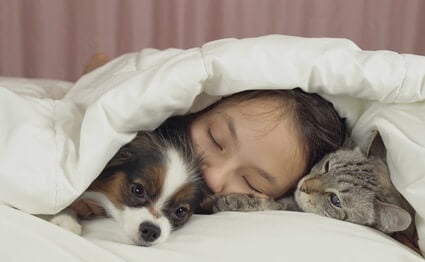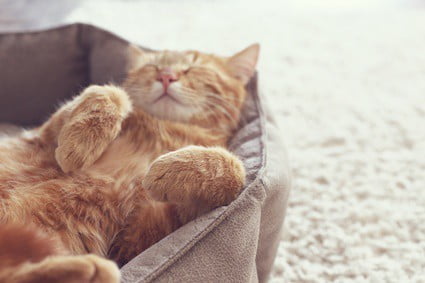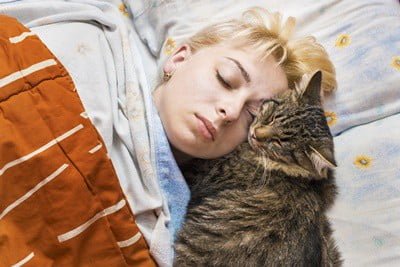You might fight it difficult to sleep during the night because of the fluffy cat invading your space. Cats appear to target the face more than anywhere if they want to snuggle in bed. Although you may shoo the feline away or reposition it to lie somewhere else on you, it keeps coming back. As annoying as this behavior is, it’s actually a good sign. It means you are doing cat ownership right.
Cats get in our faces while we sleep because they seek warmth and safety. To preserve energy, cats use humans as a source of heat while they sleep. Since our heads are one of the warmest parts of our bodies, cats naturally curl up nearby. We also provide a sense of safety and comfort to our cats, which is why they choose to snuggle up to our faces for sleep. Not only is our presence and warmth a comfort, but so is our scent.
Cats can tell a lot about us by our smell, which is why they sniff at our faces. Cats may also sleep on or near our heads at night to avoid being kicked or rolled on by restless sleepers. Even more so, cats enjoy just spending time with us. Your cat may sleep so close purely because it wants to be with you. It may even want to reinforce the family bond by marking you with its scent.
Why Do Cats Lay On Your Face At Night?
A question that has utterly perplexed cat owners for years is why our feline friends insist on sleeping on or near our faces at night. Many of us have woken up to a mouthful of fur or a tail draped over our eyes. It’s confusing, slightly unpleasant, and can be frustrating for those with breathing difficulties.
The thing is, a cat getting in your face is actually a good sign. For all the reasons cats perform this act, they will only do so if they trust you and want to show you affection. Always remember this when you are annoyed by your cat smooshing itself into your face. It loves you, trusts you, and shows you this in the only way it knows how.
Beyond warm and fluffy feelings, there are a few explanations why cats are so persistent in getting close to our faces during sleep. Understanding these reasons is important if you want to set boundaries with the cat.
Warmth
As noted in the Journal of General Virology, a cat’s internal body temperature ranges from 100.4 Fahrenheit to 102.2° Fahrenheit. Maintaining this temperature requires energy. Cats, like many animals, conserve energy where they can, even if they have an abundant and consistent food source.
Finding a warm place to sleep is one way to do this, as the body doesn’t have to work as hard to produce heat. In humans, our heads are one of the warmest parts of the body. A lot of heat also escapes from this area and leeches into the pillow. Naturally, a cat will seek out this warmth when it settles down for sleep. It may curl up beside your face or share your pillow, especially in colder weather.

Comfort
Cats will seek out a safe, comfortable place to sleep. In this case, the safe place is your face or near it. Aside from being close to you physically, your scent is of great comfort to a cat. This is because cats have a good sense of smell and use scents to navigate the world.
A cat has over 200 million odor sensors in its nose. This makes your cat’s sense of smell 14x more powerful than your own. It can identify the places you inhabit the most by smell. Those places are spaces of great comfort to a cat, which is why it sleeps in your bed. It can also be why it prefers your favorite chair or your spot on the couch over other perches.
Your pillow is heavily imbued with your scent, as is your hair. Your cat may wish to be as close to these objects as possible. The strength of these scents is a comfort to the cat and a sign that it feels safe in your presence.
Young cats and kittens will seek out the comfort of their family persistently, especially to sleep. That’s why juveniles may insistently rest up against your neck, both while being held and while sleeping.
Lack Of Disturbance
Many people toss and turn in their sleep. If a cat wants to share your bed, it has to pick a specific area to remain safe. Otherwise, it may be accidentally squished or bumped in the night.
As fidgeting sleepers usually keep their heads relatively still, this makes your pillow a tempting place to rest. The cat may choose to snuggle close to your face in preference to sleeping at the foot of the bed.
Territory
Cats use their sense of smell for many things, including identifying territories. Cats mark territory through smell. As such, a cat will be comforted by sleeping in or on objects marked with its own scent. If the spot smells like you instead, it will also find comfort since it’s your protected territory.
A cat needs to feel secure to sleep. Being firmly in a place surrounded by your and its scent will allow the cat to feel secure enough to rest. Obviously, where these scents are most concentrated is where the cat will choose to sleep. That equals your pillow and near your head.
Veterinary Clinics notes that face rubbing or bunting is a communication method used to mark territory and display affection. Your cat will mark its territory by rubbing its face against you, even while you sleep.
Status
Multi-cat households may see conflict between the animals as they try to establish a hierarchy. Even homes without such troubles will likely see a kind of ranking system develop. The ‘alpha cat’ may sleep on your bed or close to your head as a way to reaffirm its place in the family.
Together Time
Beyond general together time, an anxious cat that suffers from lonesomeness may comfort itself by sleeping as close to you as it physically can. If separation anxiety is the reason why your cat sleeps on your face, then there will be other behavioral symptoms. These can include:
- Destructive behaviors
- General anxiety
- Not leaving you alone
- Distress when you leave the home
Why Does My Cat Get So Close To My Face?
Cats get close to our faces as a way to show us that they trust us and are making sure we know it. See, cats mark their favorite people with their own scent. This is a comfort to the cat and tells any other animals that you are part of this cat’s family. In territorial creatures, this is pretty important and a sign that your cat loves you.
Why Do Cats Sleep On Faces?
Adult cats pick up a lot of behaviors when they are young kittens. This includes sleeping or cuddling up to your face and neck.
Kittens enjoy snuggling close for your warmth and the safety you represent. It is utterly adorable when they curl up under our chin and in the crook of our neck. As the kitten grows larger, it can become uncomfortable. By this stage, it can be hard to discourage the behavior, as it has become ingrained.
If you want to discourage this behavior, you will have to teach the kitten to sleep in its own space. Try giving it its own bed with a hot water bottle to mimic your warmth.

Why Do Cats Sniff Your Face When Sleeping?
We’ve all been shocked awake by the touch of a cold nose to the cheek. Upon opening our eyes, we discover our cat is sniffing at our face. It’s a rude awakening, made all the more confusing by the cat’s unexplained actions. So, why do cats sniff at our faces while we sleep?
In part, cats sniff at us to check-in. A great deal about our status can be derived from our scent when you have a cat’s sense of smell. A cat can:
- Immediately tell if we’re injured or sick
- Learn a degree of our emotional state
- Understand who or what we’ve come in contact with recently by our smell
- Your cat can also tell if its own scent markings on you are fading
As for why our cats sniff our faces while we’re sleeping, the most likely answer is the ease of access. We tend to shy away from any object approaching our face that is beyond our control. Even if we adore our feline companions, we may still shy away when they get in your face. Being asleep allows our cats the opportunity to get a strong whiff of our status.
Why Is My Cat Obsessed With My Face?
Cats sleeping on an owner’s face is not uncommon. It isn’t a bad sign, no matter how frustrating it can be to wake up with a mouthful of fur. A cat that chooses to sleep close to your head is a cat that trusts and loves its owner.
It may be annoying when your cat is so obsessed with your face. However, remember that it is displaying affection or seeking security and comfort.
Cats need to feel safe and secure to sleep at night. The thing that brings them comfort may well be their owners. This includes not only their presence but their warmth and scent. Young cats and kittens actively seek out this type of comfort and may carry the habit into adulthood.


My 5 year old tuxedo cat has her own bed in front of the bedroom door. She recently started to sleep on my sneakers. Her face is completely in the sneaker and she sleeps comfortably for a while and then returns to her bed…should I be concerned?
While my kitty is up around my face her front paws are moving up and down. Why do they do that? Please answer.